Penn College science faculty establish brewing research lab
Friday, April 14, 2023
Photos by Cindy Davis Meixel, writer/photo editor
A lot of science goes into a can or glass of beer, and the newly established Penn College Brewing & Fermentation Research Lab at Bald Birds Brewing Co. in Jersey Shore is intent on investigating all of the components that impact taste, from production to distribution to storage.
Set up in a corner room of the production brewery inside Bald Birds’ massive, 153,000-square-foot facility, the small research lab has big plans. Its goal is to become a nationally known laboratory for brewing and fermentation research accessible to students, faculty and industry.
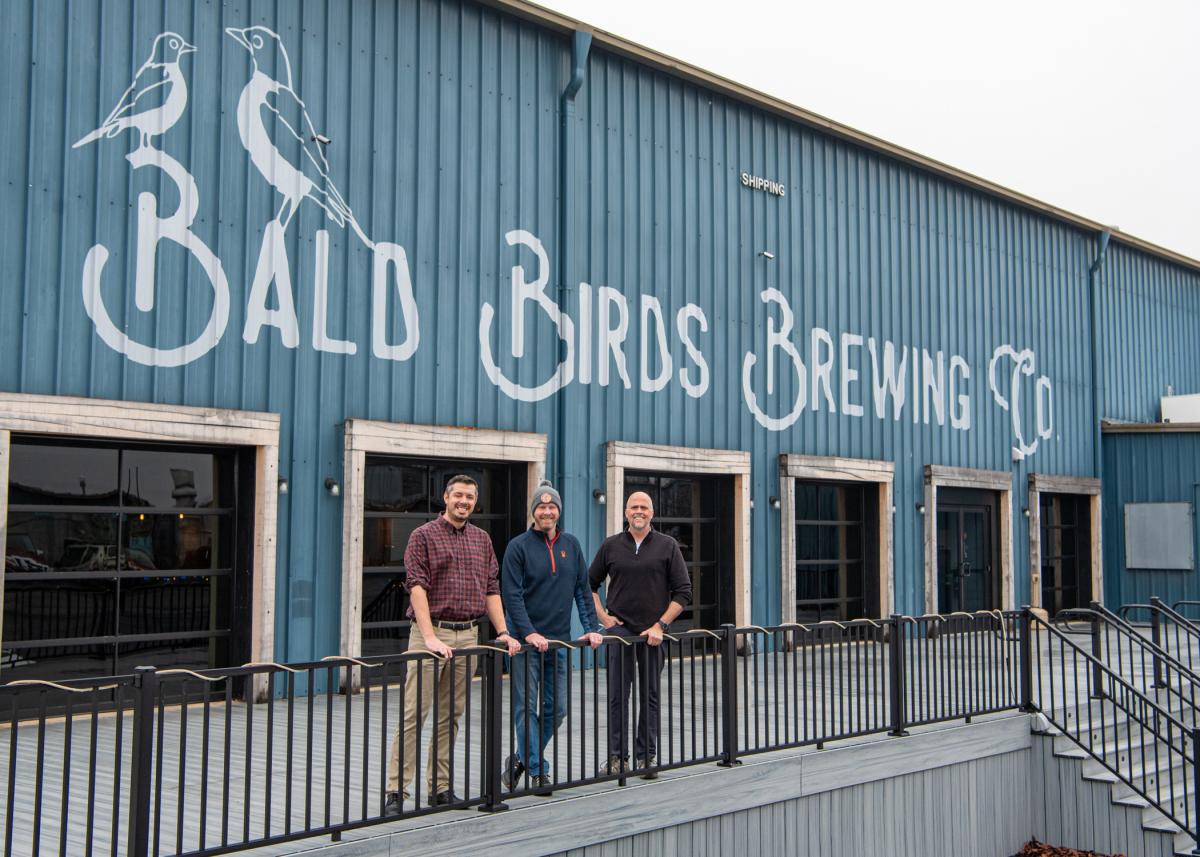
At Bald Birds Brewing Co. in Jersey Shore, owner Joey Feerrar (center) joins Pennsylvania College of Technology faculty Justin M. Ingram (left) and John F. Tamblin to celebrate the launch of the Penn College Brewing & Fermentation Research Lab.
The Penn College Brewing & Fermentation Research Lab is the brainchild of Justin M. Ingram, associate professor of biology at Pennsylvania College of Technology.
“I’m a researcher by trade, and over a year ago, I became active in the American Society for Brewing Chemists to learn more about the brewing research world,” Ingram explained. “ASBC has not only research articles but methodology on how to measure different components of beer, such as color, bitterness, alcohol and sugar concentration, with scientific equipment. I thought trying some of these methodologies could help faculty, our brewing students and the brewing industry learn something new.”
Ingram was among educators involved in creating Penn College’s brewing & fermentation science program, which began in Fall 2017 in response to the brewing industry’s need for skilled employees. The major offers a one-year certificate to adults 21 years or older.
He sees the research lab as an exciting opportunity for those students, as well as others, to gain scientific research experience that could broaden their skill sets.
“Ideally, we’d like to recruit students who are looking to fulfill a capstone project or any student who wants to gain scientific research experience,” Ingram added.
With a seemingly endless list of research possibilities, Ingram is also hopeful that the lab’s findings could be published in educational journals, further promoting Penn College as a leader in education and research.
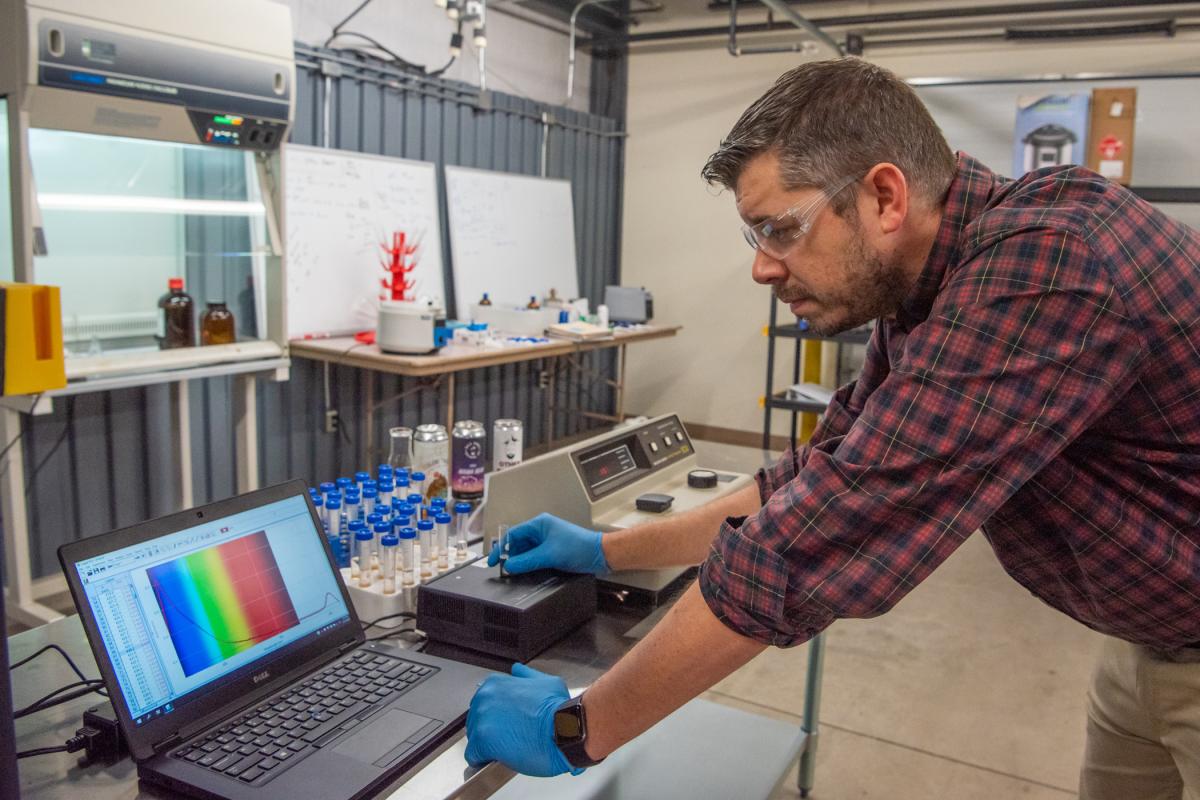
Working at the Penn College Brewing & Fermentation Research Lab inside Bald Birds Brewing Co. in Jersey Shore, Pennsylvania College of Technology faculty member Justin M. Ingram isolates bitterness compounds from craft beer samples and uses a spectrophotometer to quantify international bitterness units.
During his investigative phase, Ingram enlisted the collaboration of fellow faculty member John F. Tamblin, assistant professor of chemistry, and the two started experimenting on various beer samples using ASBC research methods and surplus equipment at the college.
“We became quite proficient at measuring color, turbidity, alcohol by volume, international bitterness units, total carbohydrates, density and pH levels in beer, and we decided to explore how we could use these methods to understand beer dynamics from production to distribution,” Ingram explained. “To do so would require various styles of fresh beer in a controlled environment, so I approached Bald Birds Brewing and asked if we could take up a small space in their production brewery. Our partnership was formed, and we now have a functional, independent research lab inside their production facility that can be used by trained individuals in industry, Penn College faculty and students.”
Immediately supportive of Ingram’s vision, Joey Feerrar, owner of Bald Birds Brewing Co., agreed to provide the space at no cost and donated $1,000 in research aid to get the lab up and running. Penn College contributed funds to buy consumables to begin testing samples.
“Joey is extremely supportive of our brewing program and receptive to exploring brewing research to understand beer dynamics,” Ingram added.
Feerrar said: “We are very excited about our partnership with the Penn College Brewing & Fermentation Research Lab. Dr. Ingram, the students and Penn College have been an amazing partner thus far, and we can’t wait to broaden our research scope and the lab capabilities. Innovation and product consistency begin and end with science. Thanks to Dr. Ingram and Penn College, we will have a top-tier lab in the industry.”
In addition to tracking changes in beer over time, taking into account various factors such as storage temperature and packaging, the Penn College Brewing & Fermentation Research Lab expects to test and compare the reliability, accuracy, features and cost of commercial products used in the brewing and distilling process and in higher education brewing-focused labs.
Studying quality and consistency in beers and brewing equipment would set the local research lab apart from a typical brewery quality assurance lab. The Penn College research lab intends to be a space to investigate and learn about a broad range of products, as well as develop new product innovations.
Interested individuals can get a taste of this budding initiative and partnership when Ingram and Jason Sapienza, head brewer at Bald Birds Brewing in Jersey Shore, deliver “Science Behind the Craft: Grain to Glass,” a free talk from 4 to 6 p.m., Saturday, May 13, at the brewery. The event will offer an interactive and immersive experience focused on understanding the science behind “the most complex beverage in the world.”
In addition to being a production brewery and taproom, Bald Birds’ location in Jersey Shore is an event venue that also features gaming areas and two golf simulators. The local business has been in the national news recently for two new products: It has partnered with KickStand Cocktails to produce a line of vodka-based beverages and has created DINK, a non-alcoholic sport drink for pickleball players. A business venture of former Arizona Cardinals player J.J. Watt, KickStand Cocktails launched in February during Super Bowl weekend in Arizona. DINK has signed a multi-year agreement with USA Pickleball and was promoted at the inaugural Pickleball Slam, held April 2 in Florida, featuring tennis icons John McEnroe, Andre Agassi, Andy Roddick and Michael Chang.
Bald Birds opened its first brewery in 2018 in Audubon, northwest of Philadelphia; the Jersey Shore site opened in 2020. The local facility is also home to Four Birds Distilling Co.
With a 100% job placement among graduates, Penn College’s brewing & fermentation science program is highly regarded in the brewing industry. Designed and taught by a master brewer with nearly 30 years of experience and education, the innovative curriculum provides hands-on learning with industry-grade equipment and taps into the math, science, technology, business and art of brewing.
To learn more about Penn College’s brewing and fermentation science certificate, call the School of Business, Arts & Sciences at 570-327-4521.
For more about Penn College, a national leader in applied technology education, email the Admissions Office or call toll-free at 800-367-9222.
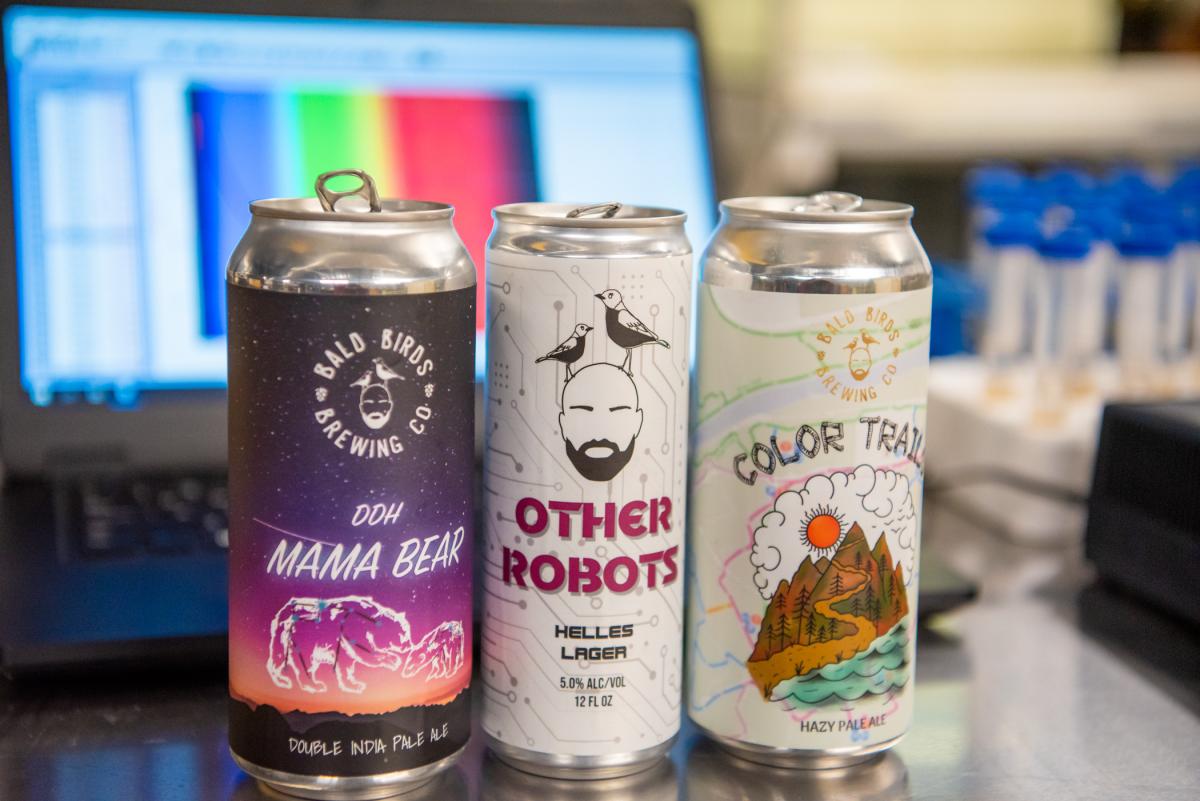
Various styles of craft beer are being tested to understand stability and shelf life.
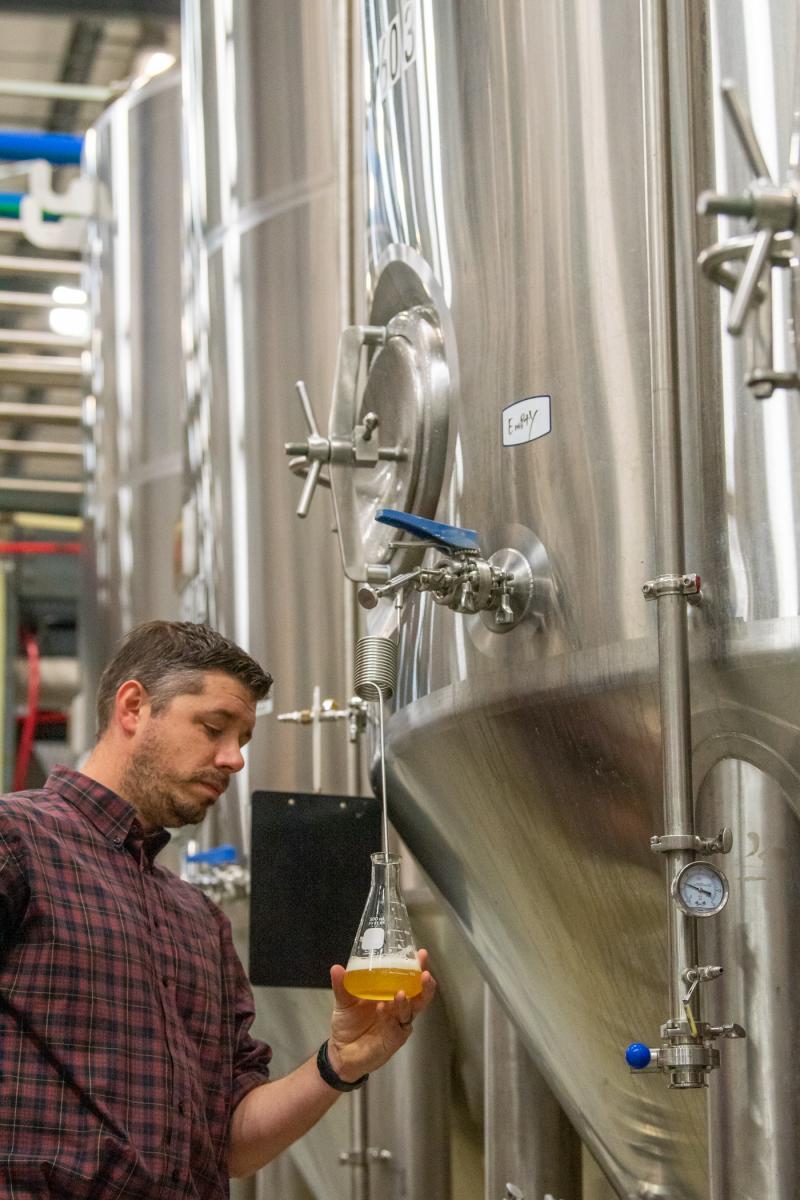
Brewing chemistry is monitored before, during and after fermentation. Here, Ingram tests a sample directly from a fermenter.
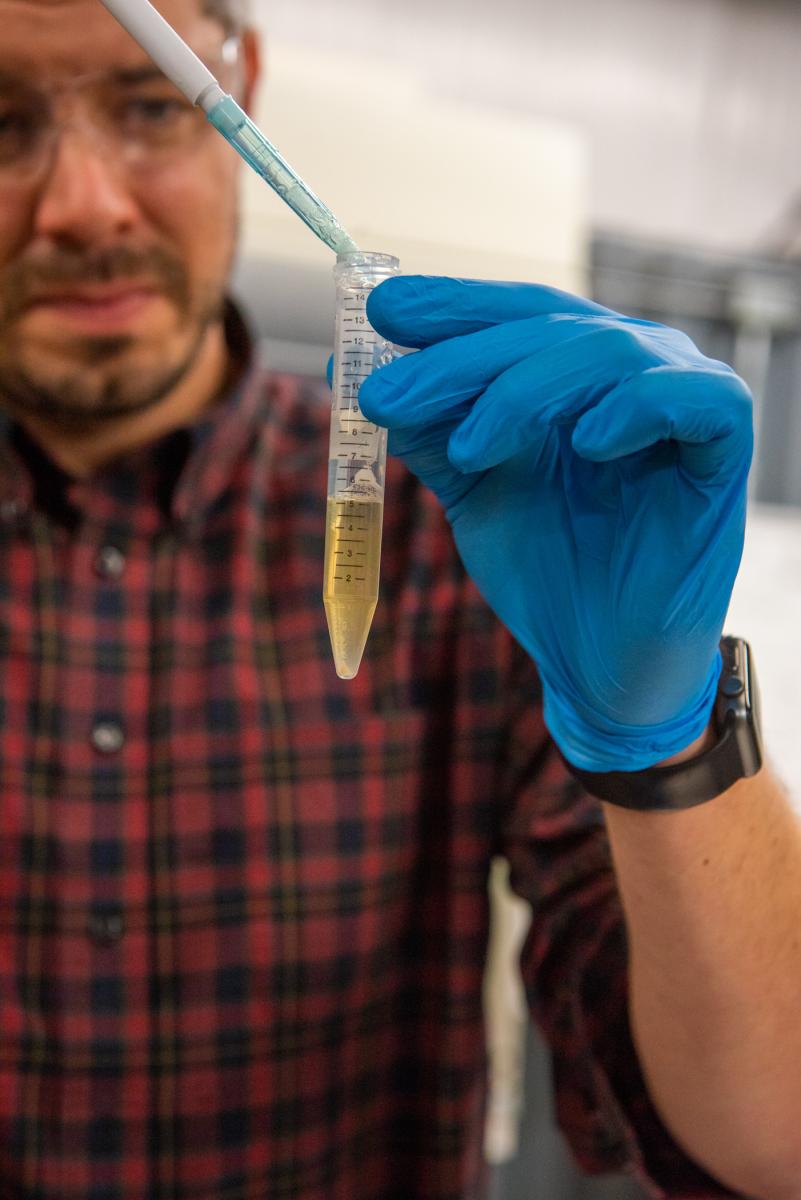
Ingram extracts bitterness compounds from a beer sample.
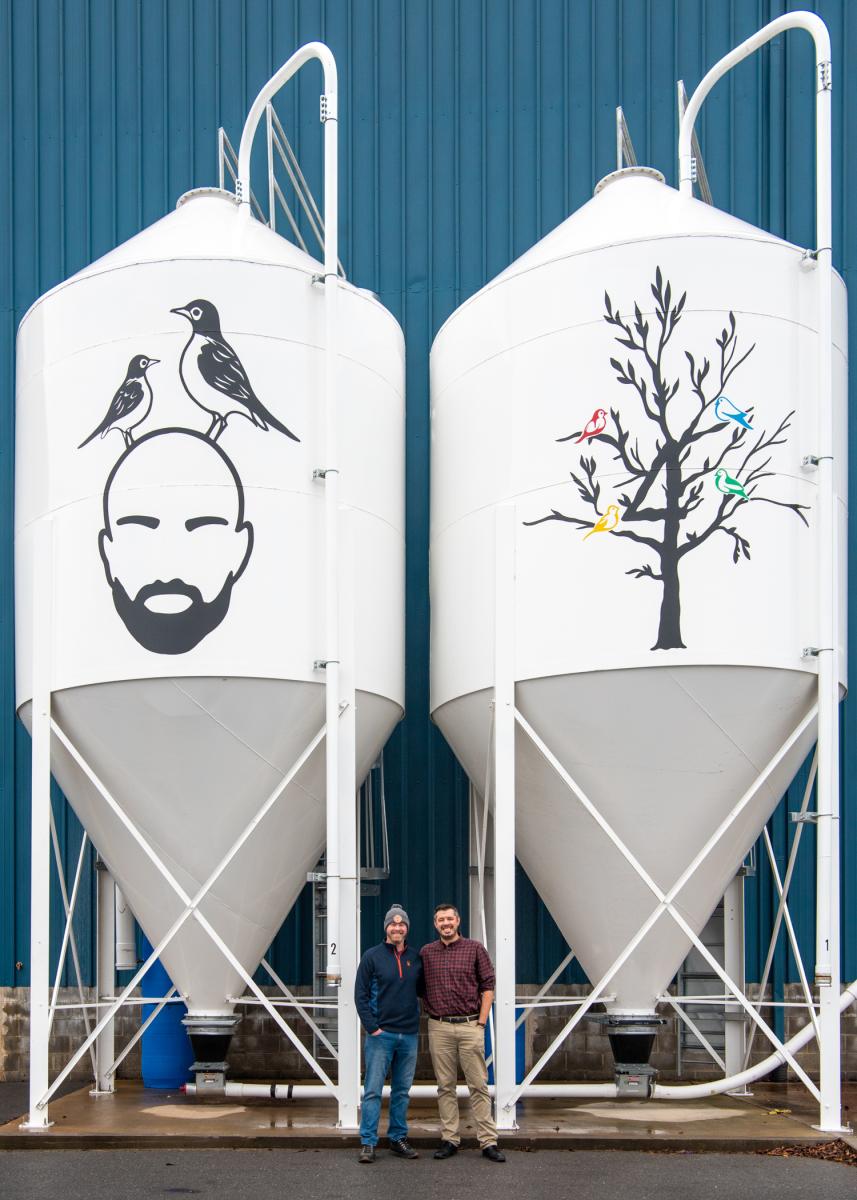
A research partnership takes flight. Feerrar and Ingram stand beside the brewery’s grain storage silos.
